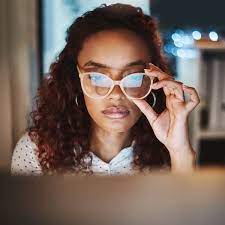
A recent study suggests that blue light glasses, despite their claims, likely do not alleviate eyestrain for individuals who spend significant time using computer screens or smartphones. The study, published this week, also questions their effectiveness in improving sleep patterns. These glasses, often recommended by optometrists and marketed as capable of filtering out the potential negative impacts of blue light from screens, such as eyestrain, dry eyes, and sleep disturbances, gained popularity during the COVID-19 pandemic when more people were engaging with digital devices due to remote work and staying at home.
Published in the Cochrane Database of Systematic Reviews, the study analyzed data from 17 clinical trials across six countries involving 619 participants. The findings indicate that there are likely no immediate benefits in reducing visual fatigue linked to computer usage when using blue-light filtering lenses compared to non-blue-light filtering ones. Laura Downie, PhD, senior author and associate professor of optometry and vision sciences at the University of Melbourne, Australia, emphasized that uncertainties remain about potential effects on long-term retinal health, vision quality, and sleep-related outcomes. Downie advised individuals to consider these findings before investing in such glasses.
Researchers noted that the limited efficacy of blue light glasses may be attributed to the fact that the amount of blue light emitted by screens is minuscule in comparison to natural daylight, as well as the fact that these lenses generally only filter out around 10%-25% of blue light.
The study’s conclusions discourage the general prescription of blue light-filtering glasses, suggesting that reducing screen time and taking regular breaks can help reduce eyestrain. Additionally, experts recommend refraining from screen use a few hours before bedtime to improve sleep quality. The researchers acknowledged limitations in their analysis, as the studies didn’t investigate various factors like contrast sensitivity, color discrimination, glare discomfort, macular health, melatonin levels, and overall visual satisfaction. Due to varying study lengths, the researchers advocate for more comprehensive research into the effectiveness of blue light-filtering glasses.
Sources:
- Cochrane Database of Systematic Reviews: “Blue‐light filtering spectacle lenses for visual performance, sleep, and macular health in adults.”
- EurekAlert: “Blue-light filtering spectacles probably make no difference to eye strain, eye health or sleep quality.”











